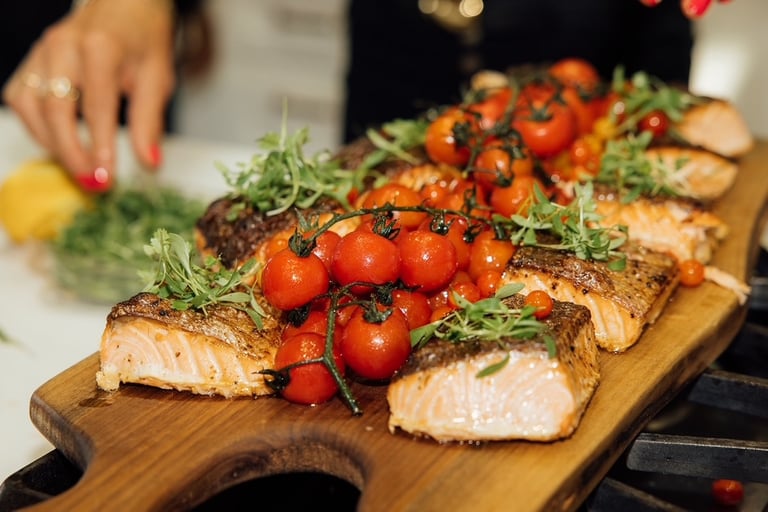Catering 101: Tips for a Successful Event
Planning an event can be a daunting task, and one of the most crucial elements is the catering. Whether you're organizing a corporate gathering, a wedding, or a social event, the food and beverage experience can make or break your occasion. In this comprehensive guide, we'll explore essential tips and strategies to ensure your catered event is a resounding success.
4/8/20254 min read


Catering is more than just providing food for your guests; it's about creating an experience that complements and enhances your event. From choosing the right menu to ensuring impeccable service, every detail contributes to the overall success of your gathering. By following these tips, you'll be well-equipped to plan and execute a memorable catered event that will leave your guests impressed and satisfied.
Choosing the Right Caterer
Research and References
Before selecting a caterer, it's crucial to do your homework. Start by checking online reviews and testimonials from previous clients
Ask for recommendations from friends or colleagues who have hosted similar events. When you contact potential caterers, don't hesitate to ask for references from their corporate client.
Experience and Expertise
Look for caterers with experience in handling events similar to yours. Their expertise in your specific type of event can be invaluable in ensuring smooth execution
Consider their reputation in the industry and their ability to handle the scale and style of your event.
Menu Tasting
Always hold a tasting before finalizing your caterer. This gives you a chance to sample their offerings and provide feedback or suggestions before the event
It's an opportunity to ensure the food meets your expectations and aligns with your event's theme and your guests' preferences.
Menu Planning
Know Your Audience
Understanding your guests' preferences is crucial when planning your menu. Consider the demographics of your attendees and any dietary restrictions they may have
This information will help you create a menu that caters to a wide range of tastes and requirements.
Offer Variety
Provide a diverse selection of dishes to accommodate different tastes and dietary needs. Include options for vegetarians, vegans, and those with food allergies or intolerances
A varied menu ensures that all your guests will find something they enjoy.
Seasonal and Local Ingredients
Opt for seasonal and locally sourced ingredients when possible. This not only ensures fresher, more flavorful dishes but also supports local producers and can be more cost-effective
Farm-to-table menus are increasingly popular and can add a unique touch to your event.
Interactive Food Stations
Consider incorporating interactive food stations into your event. These can include build-your-own taco bars, DIY sushi rolls, or pasta stations
Such elements add an engaging and fun dimension to your catering, allowing guests to customize their meals.
Logistics and Planning
Venue Considerations
Work with your coordinator, who will help with any restrictions or requirements for catering the venue requires. Ensure there's adequate space for food preparation, serving, and dining. If you're considering food trucks, check if the venue allows them and has sufficient space
Timing and Schedule
Plan your catering schedule carefully. Allow sufficient time between courses and consider the overall flow of your event
If you're hosting a conference, look into delegate packages that predetermine your event schedule, making it easier to plan meal and refreshment times.
Equipment and Staffing
Ensure you have all the necessary equipment for food preparation and serving. This includes having enough cutlery, dishes, and serving utensils
Adequate staffing is also crucial for smooth service and guest satisfaction.
Food Safety and Hygiene
Personal Hygiene
Enforce strict personal hygiene standards for all catering staff. This includes proper handwashing, wearing clean uniforms, and using gloves when handling food.
Temperature Control
Proper temperature control is essential for food safety. Use thermometers to check that hot foods are kept at 63°C or above and cold foods at 8°C or below
Ensure that all staff are trained in proper food handling and temperature monitoring procedures.
Allergen Management
Be vigilant about allergen management. Clearly label all dishes with potential allergens and train staff to handle allergen-related inquiries from guests
This is not just a courtesy but a critical safety measure.
Sustainability Practices
Reduce Food Waste
Implement strategies to minimize food waste. This can include careful portion control, donating excess food to local shelters (where permissible), and using compostable or recyclable serving ware
Eco-Friendly Options
Consider offering plant-based options, which are not only popular but also more environmentally friendly. Use sustainable packaging and serving materials where possible
Presentation and Service
Aesthetic Appeal
The presentation of your food is almost as important as its taste. Ensure that dishes are beautifully presented with appropriate garnishes and served on clean, attractive platters
The visual appeal of the food can significantly enhance the overall dining experience.
Professional Service
Train your staff to provide professional and courteous service. This includes being knowledgeable about the menu, attentive to guests' needs, and maintaining a positive attitude throughout the event
Feedback and Improvement
Guest Surveys
After the event, gather feedback from your guests about their catering experience. This can be done through surveys or informal conversations
Use this feedback to improve future events and maintain a high standard of service.
Post-Event Analysis
Conduct a thorough post-event analysis with your catering team. Discuss what worked well and areas for improvement. This reflection is crucial for continuous enhancement of your catering services.
Conclusion
Successful event catering requires careful planning, attention to detail, and a focus on quality and guest satisfaction. By following these tips, you can create a memorable dining experience that complements and enhances your event. Remember, the key to great catering is not just in the food itself, but in how it's prepared, presented, and served. With the right approach, your catered event will be talked about long after the last plate is cleared.




